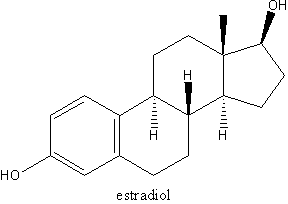Many studies have found that estrogen therapy in postmenopausal women may prevent or slow the decline in cognitive function. A meta-analysis of these studies concluded that there is a 34 percent reduction in the risk of dementia in patients treated with estrogen. However, recent randomized controlled trials have not shown consistently that estrogen therapy has a positive impact on cognitive function. In two larger trials evaluating estrogen and progesterone therapy, no benefits in cognition were found between treated and untreated women. Viscoli and colleagues evaluated estrogen therapy and its impact on cognitive decline in postmenopausal women with cerebrovascular disease.
The authors conducted a randomized, double-blind trial of 17 [beta]-estradiol (Estrace) versus placebo in postmenopausal women who had a nondisabling ischemic stroke or transient ischemic attack (TIA). The participants were randomized to receive 1 mg of 17 [beta]-estradiol daily or placebo. Women with an intact uterus were given a progestin for 12 days each year to screen for hyperplasia. Patients' cognitive function was evaluated at the start and end of the study. The primary outcome measure was patients' scores on the Mini-Mental State Examination (MMSE). Secondary outcomes were measured using five cognitive domain tests: the Modified Boston Naming Test for language function and naming ability; Digit Span for attention, short-term verbal memory, and storage capacity; Word List Generation for verbal fluency and semantic memory; Disk Spatial Recognition for visual recognition memory and the ability to learn new visual information; and Delayed Naming for incidental memory. In addition, a depression scale was administered to each patient.
A total of 461 women met the inclusion criteria and completed the study, with an average age of 70 years and an average education duration of 12 years. Thirty-nine percent of the participants had a baseline score on the depression scale that was indicative of depression. The study lasted a median of 38 months in the estradiol group and 40 months in the placebo group. The median baseline MMSE score was 28 for both groups, with an average decline of less than one point. There was no significant difference between the estradiol and placebo groups with regard to decline in MMSE scores, although the decline in the estradiol group was slightly less. There were trends towards less decline in the estradiol group in all five assessment domains except for delayed recall. Participants who had normal MMSE scores of 28 to 30 and were treated with estradiol did have a significantly smaller decline in MMSE score compared with the placebo group.
The authors conclude that estradiol did not have significant effects on cognitive measures in postmenopausal women. They add that there may be some benefit to estradiol in reducing the risk of cognitive decline in women who have normal cognitive function before beginning therapy.
KARL E. MILLER, M.D.
Viscoli CM, et al. Estrogen therapy and risk of cognitive decline: results from the Women's Estrogen for Stroke Trial (WEST). Am J Obstet Gynecol February 2005;192:387-93.
COPYRIGHT 2005 American Academy of Family Physicians
COPYRIGHT 2005 Gale Group



